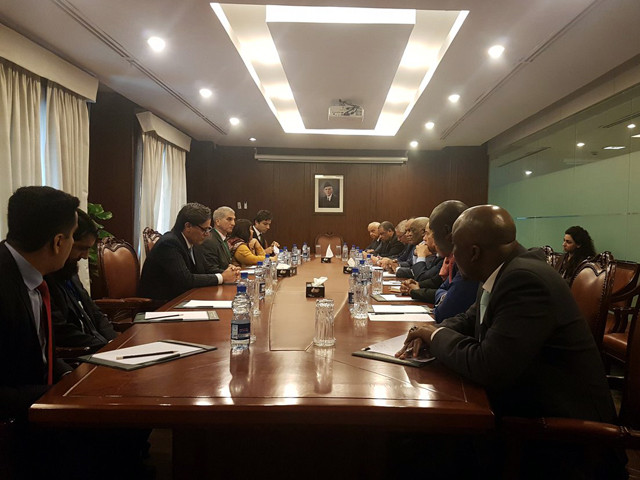Indian allegations threat to regional peace, Janjua tells foreign envoys
FO Spokesperson Dr Faisal urges New Delhi to end ‘state terrorism’ in IoK and pursue path of dialogue

Foreign Secretary Tehmina Janjua takes ambassadors of African countries and SCO states into confidence on the Pulwama attack at a special briefing at the Foreign Office. PHOTO: FO
Foreign Secretary Tehmina Janjua took the ambassadors of African countries and the Shanghai Cooperation Organisation (SCO) states into confidence on the Pulwama attack at a special briefing at the Foreign Office, the spokesman said in a tweet.
Briefing by FS to resident Ambassadors regarding #PulwamaAttack continue at MOFA. #African Ambassadors briefed today. Deliberate anti-Pakistan frenzy being spurred in India. Baseless Indian allegations & aggressive rhetoric counterproductive&threat to regional peace. pic.twitter.com/yQTuikfEZf
— Ministry of Foreign Affairs - Pakistan (@ForeignOfficePk) February 17, 2019
Janjua recalled the familiar pattern, adopted by India in the past, of blaming Pakistan soon after such incidents without investigation and pointed out to the deliberate anti-Pakistan frenzy being spurred in the neighbouring country.
She said the baseless Indian allegations and aggressive rhetoric were counterproductive and a threat to regional peace.
India withdraws security of Kashmiri leaders after Pulwama attack
Meanwhile, Foreign Office spokesperson Dr Muhammad Faisal also fired a broadside at New Delhi asking the government of Prime Minister Narendra Modi to end the state repression in the Indian-occupied Kashmir and pursue the path of dialogue.
“Bluster, belligerence and pursuit of expedient standards to suit internal political interests is both delusional and counterproductive,” Dr Faisal said in a statement issued on Sunday.
“India must come out of the denial mode, end state repression against Kashmiri youth, address widespread alienation In IoK and pursue the path of dialogue,” he added.
The chief FO spokesperson was responding to media queries on “absurd claims” made by spokesperson of the Indian Ministry of External Affairs on February 15 about Foreign Secretary’s briefing to the diplomatic corps over the deadly Pulwama attack that killed 44 members of India paramilitary force in the occupied Kashmir on February 14.
Indian media confuses Pulwama attack ‘conspirator’ with Lal masjid cleric
Dr Faisal said Pakistan had rejected Indian allegations as these were made within a short time from the attack and without carrying out any investigations. “These knee-jerk and pre-conceived accusations were nevertheless consistent with well-rehearsed tactics from Indian playbook after such incidents in the past,” he added.
As for Indian assertions about the proscribed Jaish-e-Mohammad (JeM) reportedly claiming responsibility of the attack and purported video of the attacker, the spokesperson questioned the selective and self-serving standards that India adhered to in this respect.
Dr Faisal drew attention to the clear dichotomy in Indian position on the issue. “On the one hand, India accepted unverified social media content as ‘gold standard’ but on the other, it chose denial when confronted with voluntary confessions and acceptance of responsibility by its serving naval commander Jadev for perpetrating terrorist violence in Pakistan.”
The spokesperson further explained that the JeM has been a proscribed entity in Pakistan since 2002 and the country was implementing its obligations on sanctions implementation.
The FO spokesperson urged India to introspect and respond to questions about its security and intelligence lapses that led to the February 14 attack. “India owes an explanation on reports of Adil Ahmed Dar’s arrest and custody since 2017.”
The spokesperson reiterated Pakistan’s desire of normalisation of bilateral relations with India. He said in his letter to Prime Minister Narendra Modi, Premier Imran Khan followed his intention of taking two steps if India takes one, with the proposal for both Foreign Ministers to meet on the sidelines of the UNGA and a comprehensive, tangible roadmap for normalisation of ties.
“It was India which cancelled the meeting on baseless pretexts. Similarly, the Pakistan Kartarpur initiative is another step aimed at improving people to people contacts and deescalating a vitiated environment.”



















COMMENTS
Comments are moderated and generally will be posted if they are on-topic and not abusive.
For more information, please see our Comments FAQ